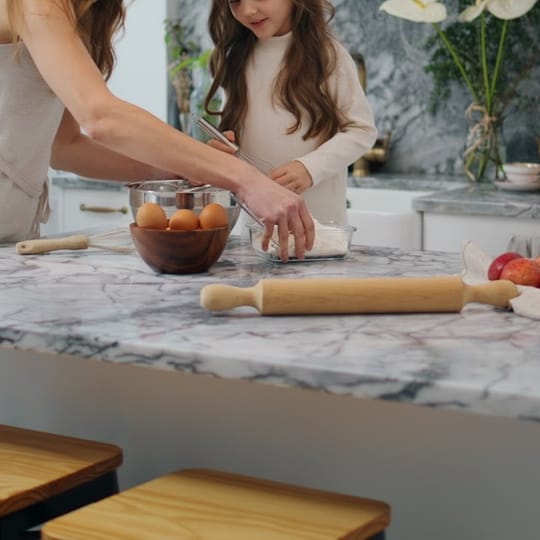
What is a reasonably clean home? (and how to get one)
We don’t want to be the nagging, harping mom. But, it happens. What other options are there when the kids won’t keep their stuff picked up?
We’re working so hard for a more clean and orderly home, yet every time we look around, we feel sabotaged. No one else seems to notice or care. We’re the only ones cleaning up and everyone else is just generating more work for us without pitching in.
How do we get the kids to do their chores and pick up their stuff? What chore system will make it so they finally help out instead of just undo?
What if we’re asking the wrong questions and looking at the whole project of cleaning house entirely wrongly?
Realistic expectations for a clean home
One of the most essential parts of my popular course Sweep & Smile is figuring out what “mostly cleanish” looks like for you. Our expectations about the state of our houses should match the season we are in.
The number and the ages of our children will impact not only the amount of stuff and the amount of help we have, but also the amount of activity. If we homeschool or are otherwise home all day every day with all the kids, our homes see more action. That means they will be more messy.
Who gets to say what reasonably clean is?
We can’t look to HGTV or the magazines or even moms who work while their kids are in school and think our houses – seeing 40+ man-hours of activity each day – should look like theirs.
Instead of working to maintain an even, “consistent” level of constant cleanliness, we should set regular times to tidy up and to clean, and let life be lived between those times.
We can accept the mess of living life, of growing and learning in our homes, when we know we will return things to neutral, reset the stage of life, once or once-and-a-half a day. That’s good enough to keep our space functional for its job and won’t turn us into harpies and nags.
Why are we cleaning the house?
After all, why are we cleaning house in the first place? The house itself isn’t the point. We aren’t serving the house, ensuring it is honored and aesthetically pleasing for its own sake. The home exists for the people who live there, not the other way around.
Because it’s easier to measure the state of the house than the state of life or people, we tend to use the state of the house as our standard – and then freak out when the house is actually used by our children for playing, learning, and growing.
A reasonably clean home is a tool
The children’s playing, learning, and growing, however, is the whole reason we keep a home. The home is just the stage for that work, not the reason for the work.
We shouldn’t cut off life for the sake of a static level of cleanliness in the home. Our goal shouldn’t be to keep the house clean, but to clean it regularly because we know it will be messy regularly.
Just like a saw does its job better when it’s sharp, so a house does its job better when it is tidy and orderly. A saw can be sharpened and then sit in its home on the garage wall, not used, showcased, and stay clean and sharp. In the same way, we can arrange our expectations, routines, and approach to our house as it the point of homemaking is having a showcase home.
A saw that is used to actually trim trees or make furniture, however, will need to be cleaned and sharpened after use. It’s better to need to clean and sharpen the saw. The used saw is serving its purpose better than the saw sitting on the garage wall.
In the same way, our homes ought to be used as the set, the stage, the background of lives well-lived. In the course of that good work, they will get messy and disturbed. Entropy will happen.
That’s why we have realistic but regular cleaning routines.
Are you responsible & reasonable?
One diagnostic for whether or not your approach to your home is focused on the house as a goal or life well-lived as a goal is how you talk about housework.
How we frame the story in our heads matters to our motivation and our attitude.
“I will” and “we will” not “we have to”
If we use phrases like “I should clean the kitchen” or “We have to clean the living room – it’s out of control” or “I ought to vacuum” then we are thinking of ourselves as servants of the home, not free women executing wisdom and discernment.
“Shoulds,” “have to,” and “ought” are categories for slaves. Now, it’s not that there is no obligation or moral imperative for us, even in the housework, but our goal should not be merely doing our duty, checking the boxes given us, and thinking that’s all.
Our real goal should be loving our duty, having our affections drawn to what is right and good. When we are doing what we enjoy, we don’t feel beat-down and stressed about the work. We don’t feel like martyrs.
There’s a world of difference in attitude and approach between saying, “I really should clean the kitchen,” and “The kitchen is pretty messy. I’ll spend 30 minutes making it better this afternoon.” The first phrases a need that makes it sound like we are powerless and subjugated by the work. The second is a free choice made in a non-stressed response to an observation. The second is responsibility in action.

Take responsibility for a reasonably clean home.
Makeover your routines AND your attitude so you can have a reasonably clean home you maintain with joy.





